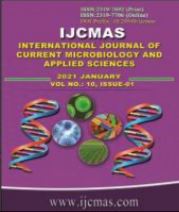


 National Academy of Agricultural Sciences (NAAS)
National Academy of Agricultural Sciences (NAAS)

|
PRINT ISSN : 2319-7692
Online ISSN : 2319-7706 Issues : 12 per year Publisher : Excellent Publishers Email : editorijcmas@gmail.com / submit@ijcmas.com Editor-in-chief: Dr.M.Prakash Index Copernicus ICV 2018: 95.39 NAAS RATING 2020: 5.38 |
The protection of nature for religious purpose is an ancient practice, many communities follow the practice of selling aside certain patches of natural vegetation as Community Conserved Areas (CCAs) or sacred grove where community norms prevent cutting of certain tree species in a light protect biodiversity through their cultural, spiritual values. Local communities play important role in protecting these plant and other elements of nature through their ethnic, social and religious practices. These ensure the survival of the grove in its original conditions. The sacred grove is an indicator and benchmark of nature that might have existed in the particular region. It is a natural laboratory, a habitat island, a gene bank and a store house of important rare and threatened plant species. The Survey was conducted in certain urban and tribal dominated area of Jhalawar district. The climate of Jhalawar district is on the whole fairy dry and healthy is one of the rainiest parts of the state of Rajasthan. The Jhalawar ecoregion is habited by Meena, Kanjar, Banjara, Bheel, Sahariya and other tribal communities and it is diversified in terms of traditional culture of its indigenous tribal communities. Diversity also prevails in plant communities used by them. This traditional culture has notable impact on the society. Total 32 sacred places and 26 tree species in Jhalawar district including temple, baories, raries and orans have been identified and surveyed. Their administration management and ecological feature along with tree species (more than 200 year) kept protected and conserved were incorporated in this study. Paper suggests what challenges do community conserved areas are facing and study of traditional culture, their threats and factors responsible for biodiversity depletion.
 |
 |
 |
 |
 |